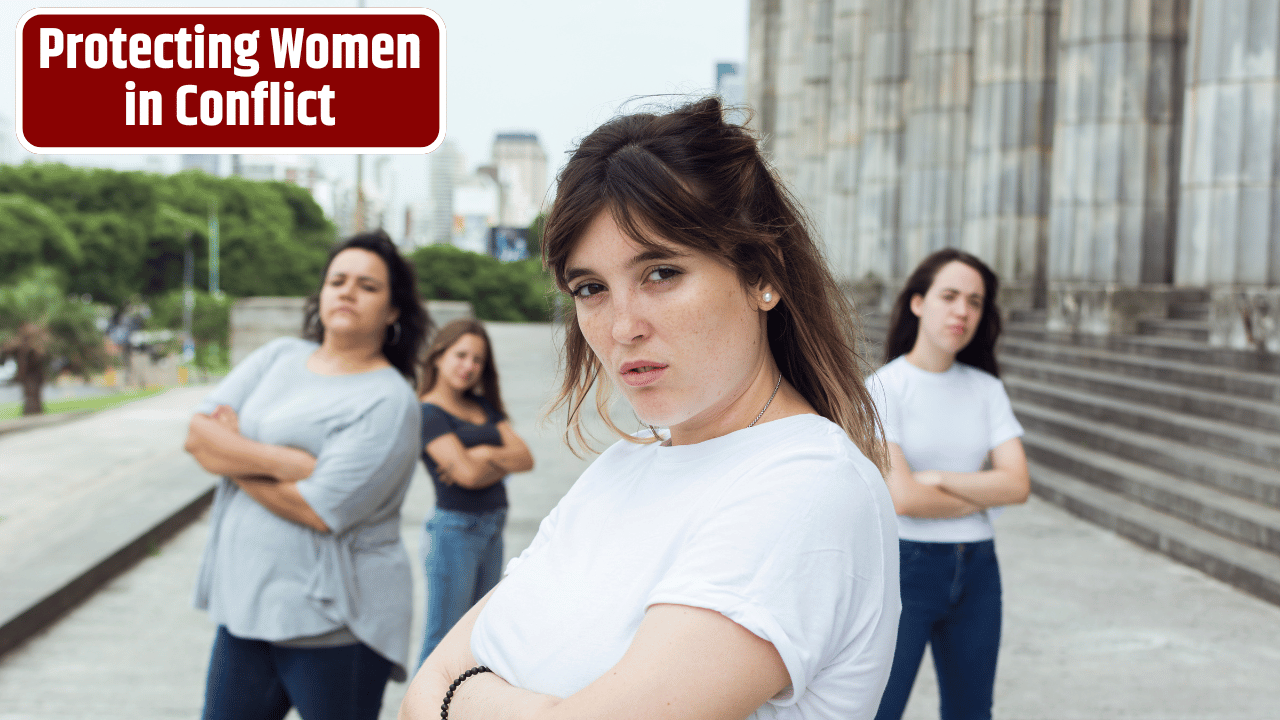It was back in college, during a guest lecture by a journalist fresh from covering conflict zones in Syria and Yemen. She narrated scenes of shattered homes, battered streets—and then, quietly but firmly, she highlighted stories of women: women enduring unspeakable violence, displaced women trying desperately to protect their children, women silenced by both gunfire and global neglect. That day, the notion that war had an impartial face vanished from my mind forever.
Sure, the Geneva Conventions exist. We’ve got international humanitarian laws promising protection of civilians during armed conflicts. On paper, they’re noble and strong. But here’s the kicker—wars aren’t fought on paper, are they? The bitter truth is, when bullets fly, laws get shaky, and amidst chaos, women disproportionately bear the scars.
Table of Contents
When Laws Aren’t Enough: The Gendered Face of Conflict
Imagine this: in times of war, violence against women isn’t just incidental collateral damage. It’s deliberate, strategic. It’s weaponized. The United Nations itself acknowledges sexual violence in conflicts as a deliberate war tactic. Disturbingly, according to Amnesty International, gender-based violence cases spike dramatically during war, with conviction rates embarrassingly low.
Now, let’s be brutally honest here—international laws haven’t kept up with this grim reality. Sure, we’ve seen UN resolutions—1325, anyone?—championing women’s involvement in peace processes and protection during conflicts. Yet, despite these grand declarations, the reality remains stubbornly bleak.
Let’s take a quick glance at the numbers:
| Conflict Zone | Women & Girls Affected (%) | Perpetrators Convicted (%) |
|---|---|---|
| Syria | Over 60% | <1% |
| South Sudan | 65% | ~1.5% |
| DR Congo | Nearly 70% | ~2% |
Numbers so chilling they make you pause. Laws exist, alright, but without accountability, enforcement, and genuine cultural shift, they’re empty shells.
Peace Without Gender Equality Isn’t Peace At All
Peace treaties and ceasefires often have a glaring blind spot—they rarely, if ever, actively integrate women’s voices or specifically address gendered violence. When the dust settles, women frequently remain traumatized and marginalized, lacking representation or even acknowledgment in post-war rebuilding processes.
Is it really peace if half the population continues suffering quietly, their pain swept conveniently under the carpet? No—peace without genuine gender equality isn’t peace at all. It’s merely a lull between storms.
Why Global Laws Need a Radical Makeover
So, here’s the million-dollar question: how do we fix this? How can laws become more than mere ink on expensive paper?
Firstly, explicit accountability. International bodies like the ICC (International Criminal Court) must robustly prosecute gender-based war crimes. No exceptions, no blind eyes turned. Nations should lose international aid or diplomatic privileges if they’re consistently negligent on gender protections.
Secondly, integrating women at every stage of conflict resolution and peacebuilding isn’t optional—it’s essential. Studies consistently show that peace agreements with women negotiators are far likelier to last. Yet, globally, less than 15% of peace negotiators have been women.
India’s Own Paradox: Loud Voices, Silent Actions
Closer home, India, despite its vibrant democracy and assertive international diplomacy, lags in supporting and championing gender-based violence accountability in war zones. We love vocalizing human rights, yet often falter when it comes to taking decisive international positions. Isn’t it about time we walk our talk, stand unequivocally behind survivors, and demand justice on international forums?
And before you shrug this off as an external problem—remember, the Kashmir region has its own complex, troubling history of gendered violence, highlighting this issue isn’t distant or irrelevant. It’s personal and immediate.
The Future Can Be Better—If We Want It To Be
I’m not naive—no global law, however comprehensive, magically erases violence. But the legal system sends a powerful message. Laws articulate our collective morality, our standards of human dignity. When they’re strong, enforced, and gender-conscious, laws become our loudest voices against atrocities.
Imagine a future where peace isn’t a mirage. Where women’s rights aren’t afterthoughts in peace talks, but integral parts. Where justice isn’t selective, delayed, or denied—but swift, unbiased, and fair.
Yes, changing international law is complicated and painfully slow. Yes, diplomacy gets tangled in politics, culture, and historical grudges. But that doesn’t mean we shouldn’t demand better. Because, quite honestly, we deserve better.
FAQs
Are there existing laws specifically protecting women in wars?
Yes—various international laws like Geneva Conventions and UN Security Council Resolution 1325 exist. But enforcement and accountability remain major challenges.
Why is sexual violence common during wars?
Sexual violence during wars is sadly used strategically—to demoralize communities, exert power, and even as a form of ethnic cleansing.
What role can women play in peacebuilding?
Women contribute significantly by negotiating sustainable peace agreements, offering community-level healing, and ensuring long-term stability.
Why does gender violence go unpunished in conflict?
Weak legal systems, lack of international political will, cultural stigma, victim intimidation, and minimal enforcement contribute to impunity.














